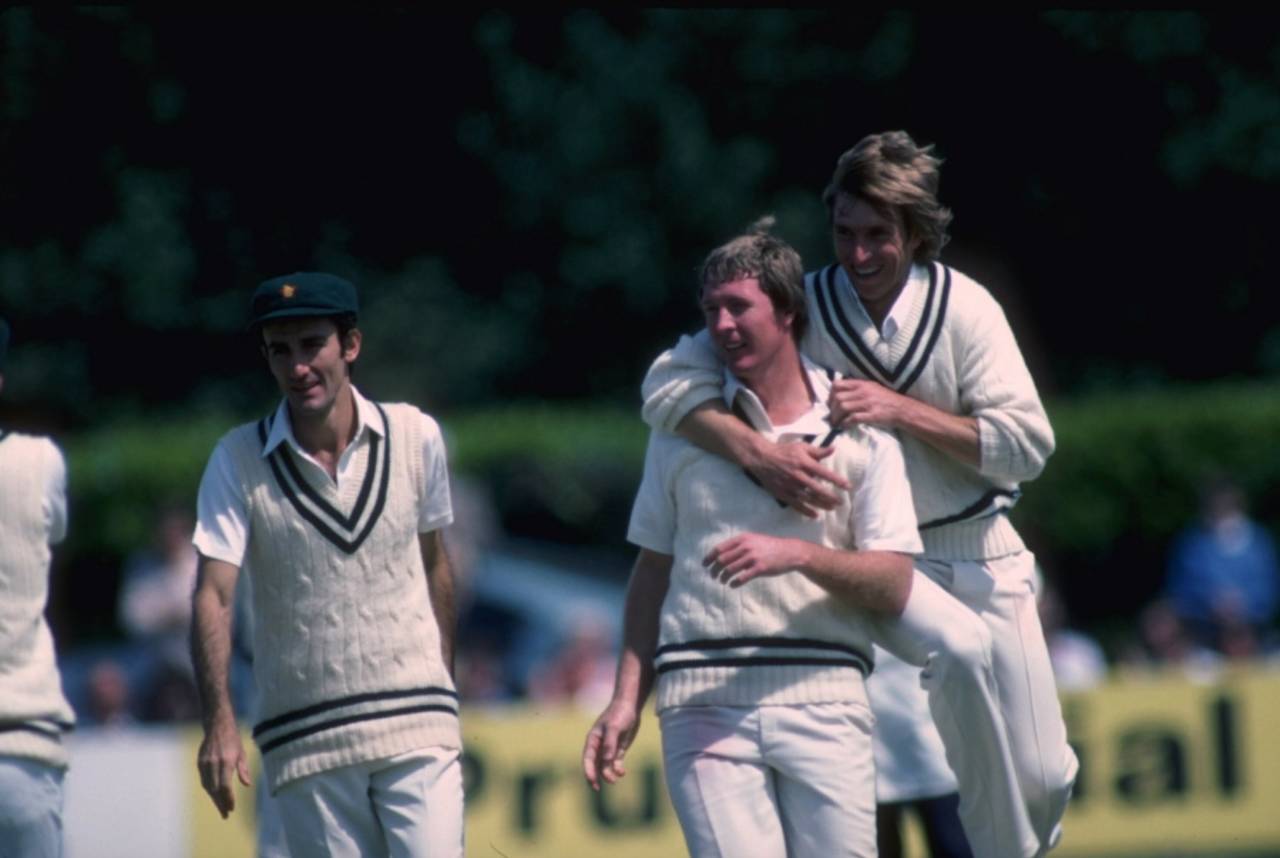Zimbabwe announce their arrival
When a group of part-time players caught Australia off the hook
Martin Williamson
21-Feb-2007

The first big upset of the 1983 World Cup • Getty Images
As was the case in the first two World Cups, the numbers for the 1983 tournament were made up by the inclusion of a minnow, Zimbabwe, who had qualified by winning the ICC Trophy a year earlier. They were in a group with Australia, India and West Indies.
Zimbabwe opened their campaign at Trent Bridge against Australia, a side with deep divisions but nevertheless one that, on paper, was far too good for a group of part-timers playing their first ODI.
Zimbabwe batted first and slipped to 94 for 5 at lunch before Duncan Fletcher, their captain, led an afternoon recovery that guided them to 239 for 6. Australia were ambling along at 114 for 2 when Fletcher, who had taken two wickets in his first spell, returned and nipped out two more - he finished with 4 for 42. With 10 overs left, Australia needed 81. Allan Border's dismissal added to the pressure, and it came down to 53 off five. It was all too much and they finished 13 runs short.
Moment
In the end, the game was done and dusted before the last over from Peter Rawson, and although Rod Marsh smacked a big six, the other balls yielded little. On the field, the Zimbabweans admitted that they only realised they were heading for victory in that final over. As the last ball was bowled, many of the seven or eight thousand inside the ground ran on to congratulate the winners. One of them apparently made a small fortune by gambling £100 on a Zimbabwean victory at odds of about 200-1, and he treated the team royally in the bar afterwards. Some of the Australians went out of their way to congratulate the Zimbabwe players, others chose to skulk out of the ground as soon as possible. The celebrations carried on through the night.
In the end, the game was done and dusted before the last over from Peter Rawson, and although Rod Marsh smacked a big six, the other balls yielded little. On the field, the Zimbabweans admitted that they only realised they were heading for victory in that final over. As the last ball was bowled, many of the seven or eight thousand inside the ground ran on to congratulate the winners. One of them apparently made a small fortune by gambling £100 on a Zimbabwean victory at odds of about 200-1, and he treated the team royally in the bar afterwards. Some of the Australians went out of their way to congratulate the Zimbabwe players, others chose to skulk out of the ground as soon as possible. The celebrations carried on through the night.
Boundary view
Amazingly, the whole upset passed by rather unnoticed for two reasons. In England everyone's attention was on the general election which took place on the same day, and news was dominated by Margaret Thatcher's re-election. There was also a strike by BBC technicians, which meant that only one match was covered, and that was England's game against New Zealand at The Oval. The Times did note that "few more deserving victories have been obtained".
Amazingly, the whole upset passed by rather unnoticed for two reasons. In England everyone's attention was on the general election which took place on the same day, and news was dominated by Margaret Thatcher's re-election. There was also a strike by BBC technicians, which meant that only one match was covered, and that was England's game against New Zealand at The Oval. The Times did note that "few more deserving victories have been obtained".
What happened next
There was one Zimbabwe player who lost out after the defeat of Australia. Opening batsman Ali Shah was chatting to some people after the game when he happened to say that if they could play as well again, they might beat India in their next game. His comments made it into the press and he was fined for breaching the team's rules on speaking to the media. Zimbabwe lost all their remaining five matches, although they again ran Australia close at Southampton, and hit the headlines when they reduced India, the eventual winners, to 17 for 5 and 78 for 7 at Tunbridge Wells before Kapil Dev's legendary 175 not out spared Indian blushes.
There was one Zimbabwe player who lost out after the defeat of Australia. Opening batsman Ali Shah was chatting to some people after the game when he happened to say that if they could play as well again, they might beat India in their next game. His comments made it into the press and he was fined for breaching the team's rules on speaking to the media. Zimbabwe lost all their remaining five matches, although they again ran Australia close at Southampton, and hit the headlines when they reduced India, the eventual winners, to 17 for 5 and 78 for 7 at Tunbridge Wells before Kapil Dev's legendary 175 not out spared Indian blushes.
Martin Williamson is executive editor of ESPNcricinfo and managing editor of ESPN Digital Media in Europe, the Middle East and Africa